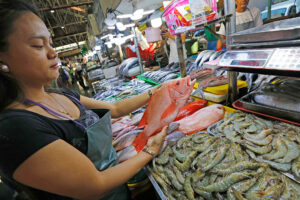




January Economic Update: Growth slows, prices rise
 DOWNLOAD
DOWNLOAD

Inflation Update: Up, up, and away?
 DOWNLOAD
DOWNLOAD

Quarterly Economic Growth Release: Growth takes on a slower pace
 DOWNLOAD
DOWNLOAD


Monetary tightening won’t risk financial stability — BSP

FURTHER MONETARY tightening to tame inflation would not risk financial stability, Bangko Sentral ng Pilipinas (BSP) Governor Felipe M. Medalla said on Wednesday.
During a forum organized by Bank Indonesia, Mr. Medalla said the central bank has pursued an aggressive policy stance in its fight against inflation, but this is unlikely to have any negative effects on financial stability.
“We are confident that 425 [basis points] and probably even more [monetary tightening] can be done without risking financial stability,” he said, adding that Philippine banks are strong.
“All things considered, the BSP’s policies have been supportive of economic growth. Future decisions will be guided by our assessment of the latest information,” he added.
The Monetary Board last week raised the benchmark policy rate by 25 bps, bringing it to 6.25% — the highest in nearly 16 years.
The BSP governor said the central bank had to deal with a depreciating peso and persistent inflationary pressures during its current tightening cycle.
“Inflation remains a top concern, and in fact — from the point of view of policy rates — the only concern,” Mr. Medalla said.
Headline inflation slowed to 8.6% in February from a 14-year high of 8.7% in January. For the first two months of the year, inflation averaged 8.6%.
Although month-on-month inflation has been stabilizing, Mr. Medalla said the BSP is confident the downward trend would continue until it reaches its 2-4% target by October.
The central bank sees inflation averaging 6% this year before easing to 2.9% in 2024.
The local statistics agency will release March inflation data on April 5.
Mr. Medalla also reiterated that Philippine banks are well-capitalized amid the recent turmoil in global financial markets.
“The banking system has withstood the challenges of the pandemic and remains resilient moving forward,” he said.
Meanwhile, the Bankers Association of the Philippines (BAP) said it has been doing its part in the national effort to sustain economic growth.
“We have always been working towards better and more responsive financial services to support the economy and improve the lives of Filipinos,” outgoing BAP President Antonio C. Moncupa said in a statement.
He said enhancing the allocation of debt capital, improving cost efficiency for financial services and more responsive banks to the growing demand of households and businesses would make the economy more efficient, and the banking system more stable.
At a general assembly on Wednesday, BAP members elected new officers for 2023-2024.
Jose Teodoro K. Limcaoco, president and chairman of Bank of the Philippine Islands, was elected president.
“Given the advocacies we have pursued throughout the years and our strong alliance with partners such as the Bangko Sentral ng Pilipinas, the Philippine banking industry continues to be in a strong position to withstand shocks and serve the needs of the Filipino public,” Mr. Limcaoco said. — Keisha B. Ta-asan
This article originally appeared on bworldonline.com





 By BusinessWorld
By BusinessWorld